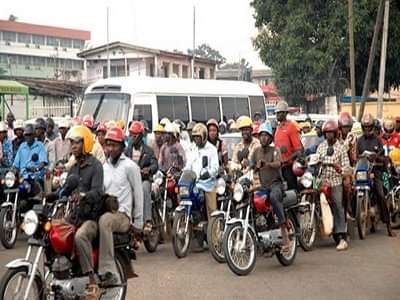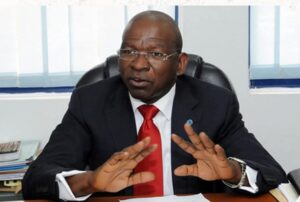The ban by the Lagos State government of okada and tricycles on 11 local government roads on Monday has laid to rest government’s position on the matter. ADEYINKA ADERIBIGBE writes on how the policy can be sustained.
Kehinde Majekodunmi (not real name), checked his watch and saw it was noon. There was no way he could meet his 2:00 p.m. appointment at his Broad Street office from Agbado, a border town with Ogun State. The only option he had was to board a commercial okada, which he does often and from his phone, he punched his destination and takeoff point.
Pronto one came, he donned his helmet and in minutes they were off. He made his office by 1.50 p.m. That was barely an hour 50 minutes on the ride. Price N2,500. But he doesn’t have to pay the rider directly. By paying through the app, he saved some N800, paying only N1, 700. Life couldn’t be better, as he went in for his crucial meeting.
If Dehinde was lucky, Abraham Bashiru and his rider were not. They escaped death by whiskers on the Jonathan Coker Road, College, Ogba last week. The rider almost ran into a trailer when a lone driver of a saloon car, opened the door of his car almost hitting Abraham’s rider when he made to overtake him, sandwiching him between the car and the trailer. He swerved, missed running under the trailer and crashed into the road median. Both sustained various degrees of injury.
Much for the second instance than the first, stakeholders and experts in the transportation sector had always urged the government to take a stand on okada and tricycle operation.
Over the years, motorists would agree, okada operators have constituted themselves into a huge menace on the road, messing up government’s transportation master plan by their ubiquitous presence on the road.
A transportation expert and founder of Safety without Borders, Patrick Adenusi said okada and tricycles are meant only for rural transportation. Sadly, however, their operators have transformed into the main transportation alternative for travelers such as Dehinde, who dashes through traffic to avoid the nightmare that goes with regular means of transportation.
According to Adenusi, there is no better time than now that government must put its foot down to give a direction where the state is headed as regards transportation plan.
For him, government’s indecisiveness has caused serious distortions to the state’s transportation plans, giving the okada and tricycle operators the ground to mushroom.
Before and after 2012
Since 2015, the two and three wheeler forms of transformation have almost taken over the transportation space with the various transportation unions setting up various control units from where operators are milked and cash ferreted to oil the pockets of pliable officials and security operatives who look the other way and allow them unfettered access to operate on the roads.
The scenario between 2015 till date was akin to the milieu in which they operated long before 2012. By that year, government enacted the Lagos State Traffic Law, which seemed to put them in check, restricting their operation from some 477 roads throughout the state.
Section 16 of the law, as well as schedule 2, not only prescribed the type of motorcycles permitted to operate on the state roads, but spelt out the various fines the chief of which was the immediate impoundment of any okada that contravened the law.
The law at the time also helped to stem the tide of road robbery and okada accidents as all general hospitals had dedicated wards for okada accident victims.
However, the gains were reversed when enforcement stopped in 2015, succumbing to obvious pressure of the gaps in public transportation options available to the motoring public and the maddening gridlock that makes the state road network a nightmare.
Before 2012, the engine capacity of okada operating across the state was lower than 100cc. The law stipulated the engine capacity of okada allowed on the state roads to be 200cc.
However, the last five years have seen the massive proliferation of 200cc okada by small firms. They latched on the lacuna of section 16 of the law, which was left untouched in the Lagos Traffic Law 2018 (as amended), and started a technology enhanced transportation business with supposedly approved capacity okada.
Such firms as the Metro Africa Xpress, better known as Max.NG floated the Maxokada, which was quickly copied by other players such as Gokada and the latest entrant into the hike-based okada business Oride, which has over 5, 000 okada shuttling Lagos metropolis alone and has stretched their tentacles to Oyo, Ogun and Edo states. These okada ply all routes, bridges and highways. To edge out competitors, one of them recently floated an express ferry shuttle.
They are regarded as the Uber alternative and most members of the public find them useful in dire circumstances.
Dean of the School of Transportation Studies, Lagos State University (LASU), Ojo, Prof. Samuel Odewunmi described these okada operators as the new saviours on the road.
At a transportation summit last year, Odewunmi acknowledged that though they were undesirable and ought not to be encouraged as a form of transportation, but closing eyes totally to them would be tantamount to denying the indices of the sector. He canvassed that the government should permit them to exist until it is able to bridge the supply gap that could cut off the needed oxygen.
For a man living in Badagry axis, the okada have been Odewunmi’s saving grace several times. But it may not be for much longer.
Last Monday, the state government issued a directive, banning the okada and tricycle on all roads in 11 local government areas and on about 40 bridges.
The order came barely after eight months after Governor Babajide Sanwo-Olu at his inauguration assured the state that he would come up with a solution to the okada menace in the state.
Only last month after a security meeting, the government declared that it was yet to come up with a solution to the okada issue.
All that changed on Monday. According to the government, okada operation would become illegal in six local government areas and nine local council development areas. It will also be illegal on 10 major highways across the state.













